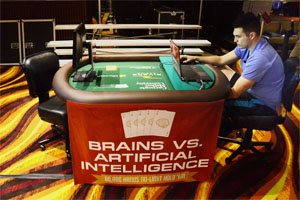Gambling Headlines
Man vs. Machine: Who emerged victorious in the ultimate poker challenge?

Doug Polk takes on Claudico in the
Brains vs. Artificial Intelligence Challenge
On the 24 April 2015 four professional poker players pitted themselves against a poker bot called "Claudico" whose artificial intelligence (AI) was developed by the computer science department of Carnegie Mellon University (CMU) ‐ in a no-limit Texas Hold'em tournament that captured the imagination of not only the gambling community but the world.
From the 24th of April until the 7th of May Doug Polk, Jason Les, Dong Kim and Bjorn Li played over 20,000 hands of poker each at the Rivers Casino in Pittsburgh USA for the chance to win $100,000 if any of them could beat Claudico. The tournament was hailed as "Brains vs AI" and spectators watched with baited breath to see what the final result would be.
Claudico's creators, a team led by CMU Computer Science Professor Tuomas Sandholm, were banking on walking away with $400,000, confident that their bot could hold its own over 80,000 hands against some of the world's best players. Professor Sandholm described the challenge as the new benchmark for Artificial Intelligence, comparing it to past challenges which were played out on chess boards. He added that poker was a game of exceeding complexity that required a computer to make decisions based on incomplete and often misleading information due to the existence of bluffing in poker game play, and in order to win, the machine would have to outwit its human opponents.
Sandholm's team also believes that the strategies they used while creating Claudico's program could be applied successfully in other fields. He stated that computing the world's strongest strategies for the challenge was a significant achievement and that the algorithms employed could have future applications in cyber security, business, military and medical fields. While obviously confident in the technology, at the outset of the challenge, Sandholm believed that the contest could go either way, giving it 50-50 odds.
The players on the other hand were not so certain of their odds. Polk, an online gaming specialist and multi-million dollar winner in live tournaments said that while he imagined that humans would have the edge it was very difficult to determine the results with any sort of certainty as he didn't know exactly what he was up against. Prior to the tournament commencing he did however share his thoughts on strategy, believing that he would vary his playing more than he would against a human opponent. He also added that he thought there would be less hand reading and fewer mind games than when playing against other people and so he had cultivated a strategic thought process for his game play accordingly.
Once all was said and done though, the four humans came out on top with the founders of the "Brains vs. Artificial Intelligence" challenge referred to the win as narrow but statistically significant.
With Doug Polk, Dong Kim and Bjorn Li emerging victorious against Claudico and only Jason Les being bested by the program, all told, the humans won a collective total of $732,713 which equated to 0.5% of the total $170 million in virtual money that was wagered during the challenge.
After 20,000 hands in the head-to-head match-ups, the individual results were as follows:
- Bjorn Li beat Claudico by $529,0333
- Doug Polk emerged the victor over Claudico by $213,671
- Dong Kim won his match against Claudico by $70,491
- Claudico triumphed over Jason Les by $80,482
In spite of a solid performance, Claudico's shortfall in the challenge has been attributed to the fact that Heads-up no-limit poker's format is one that requires not only game strategy but also reaction to psychological warfare waged by each opponent and for this reason alone, computer playing programs are not yet on par with the human brain's capabilities.
Polk, the player earning the second largest win against the program commented that Claudico was good but not a top player, he also commented on some of Claudico's seemingly odd betting choices, like wagering $19,000 in order to win $700, something that most humans would not do.
And these types of decisions will be difficult to explain using simple statistical analysis due to the sheer size of the data collected during the sessions. Another interesting point is that Claudico has been programmed to function according to game-theory-optimal (GTO) mode, which adheres to strategy instead of the opponents individual game play style, which can be either a strength or weakness.
Nevertheless, Claudico's developers now have 80,000 hands of data to analyse and learn from, which can only make future AI programs even better. But for now, the humans emerged victorious and walked away with $100,000 each in appearance fees from the sponsors.

